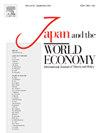Investigating how inflation expectations affect precautionary wealth
IF 1.2
4区 经济学
Q3 ECONOMICS
引用次数: 0
Abstract
This study examines how inflation expectations affect precautionary wealth by focusing on the period of zero or low-interest rates in Japan and using Japanese household survey data during this period. The key finding of this paper is that experienced inflation as a proxy for inflation expectations has a positive impact on the target ratio of precautionary wealth to permanent income. This is consistent with the prediction of the buffer stock (Carroll, 1997) that given the nominal interest rate (as has been observed in Japan), higher inflation expectations raise the target ratio when households expect higher inflation to translate into their nominal income in a limited way. This study also confirms that actual liquid wealth gradually converges to the target level of precautionary wealth over the years, which is consistent with the implications of the buffer stock model.
调查通胀预期如何影响预防性财富
本研究通过关注日本零利率或低利率时期,并使用这一时期的日本家庭调查数据,考察了通胀预期如何影响预防性财富。本文的主要发现是,经验通胀作为通胀预期的代表,对预防性财富与永久收入的目标比率有积极影响。这与缓冲存量(Carroll, 1997)的预测是一致的,即给定名义利率(正如在日本观察到的那样),当家庭期望较高的通货膨胀以有限的方式转化为名义收入时,较高的通货膨胀预期会提高目标比率。本研究还证实,实际流动财富多年来逐渐收敛于预防性财富的目标水平,这与缓冲库存模型的含义是一致的。
本文章由计算机程序翻译,如有差异,请以英文原文为准。
求助全文
约1分钟内获得全文
求助全文
来源期刊

Japan and the World Economy
ECONOMICS-
CiteScore
2.60
自引率
0.00%
发文量
26
审稿时长
46 days
期刊介绍:
The increase in Japan share of international trade and financial transactions has had a major impact on the world economy in general and on the U.S. economy in particular. The new economic interdependence between Japan and its trading partners created a variety of problems and so raised many issues that require further study. Japan and the World Economy will publish original research in economics, finance, managerial sciences, and marketing that express these concerns.
 求助内容:
求助内容: 应助结果提醒方式:
应助结果提醒方式:


